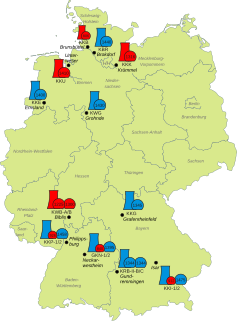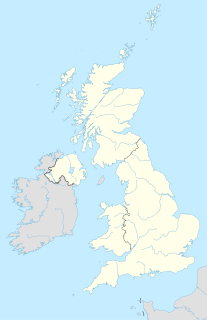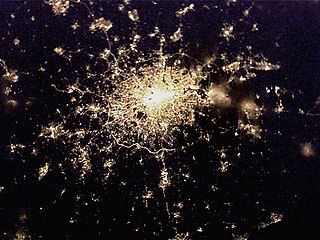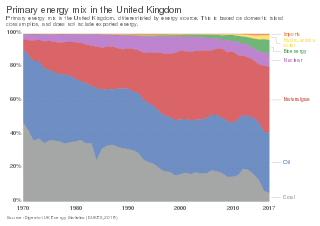Related Research Articles

Scottish Power is a vertically integrated energy company based in Glasgow, Scotland. It is a subsidiary of Spanish utility firm Iberdrola.
British Energy was the UK's largest electricity generation company by volume, before being taken over by Électricité de France (EDF) in 2009. British Energy operated eight former UK state-owned nuclear power stations and one coal-fired power station.
Energy policy is the manner in which a given entity has decided to address issues of energy development including energy conversion, distribution and use. The attributes of energy policy may include legislation, international treaties, incentives to investment, guidelines for energy conservation, taxation and other public policy techniques. Energy is a core component of modern economies. A functioning economy requires not only labor and capital but also energy, for manufacturing processes, transportation, communication, agriculture, and more. Energy sources are measured in different physical units: liquid fuels in barrels or gallons, natural gas in cubic feet, coal in short tons, and electricity in kilowatts and kilowatthours.

Nuclear energy policy is a national and international policy concerning some or all aspects of nuclear energy and the nuclear fuel cycle, such as uranium mining, ore concentration, conversion, enrichment for nuclear fuel, generating electricity by nuclear power, storing and reprocessing spent nuclear fuel, and disposal of radioactive waste.

The Price-Anderson Nuclear Industries Indemnity Act is a United States federal law, first passed in 1957 and since renewed several times, which governs liability-related issues for all non-military nuclear facilities constructed in the United States before 2026. The main purpose of the Act is to partially compensate the nuclear industry against liability claims arising from nuclear incidents while still ensuring compensation coverage for the general public. The Act establishes a no fault insurance-type system in which the first approximately $15 billion is industry-funded as described in the Act. Any claims above the $12.6 billion would be covered by a Congressional mandate to retroactively increase nuclear utility liability or would be covered by the federal government. At the time of the Act's passing, it was considered necessary as an incentive for the private production of nuclear power — this was because electric utilities viewed the available liability coverage as inadequate.

Nuclear power in the United Kingdom generates 20% of the country's electricity, as of 2020. The UK has 13 operational nuclear reactors at six locations, as well as nuclear reprocessing plants at Sellafield and the Tails Management Facility (TMF) operated by Urenco in Capenhurst.

Energy use in the United Kingdom stood at 2,249 TWh in 2014. This equates to energy consumption per capita of 34.82 MWh compared to a 2010 world average of 21.54 MWh. Demand for electricity in 2014 was 34.42 GW on average coming from a total electricity generation of 335.0 TWh.

The current energy policy of the United Kingdom is the responsibility of the Department for Business, Energy and Industrial Strategy (BEIS), after the Department of Energy and Climate Change was merged with the Department for Business, Innovation and Skills in 2016. Energy markets are also regulated by the Office of Gas and Electricity Markets (Ofgem).

Energy security is the association between national security and the availability of natural resources for energy consumption. Access to (relatively) cheap energy has become essential to the functioning of modern economies. However, the uneven distribution of energy supplies among countries has led to significant vulnerabilities. International energy relations have contributed to the globalization of the world leading to energy security and energy vulnerability at the same time.

Renewable energy commercialization involves the deployment of three generations of renewable energy technologies dating back more than 100 years. First-generation technologies, which are already mature and economically competitive, include biomass, hydroelectricity, geothermal power and heat. Second-generation technologies are market-ready and are being deployed at the present time; they include solar heating, photovoltaics, wind power, solar thermal power stations, and modern forms of bioenergy. Third-generation technologies require continued R&D efforts in order to make large contributions on a global scale and include advanced biomass gasification, hot-dry-rock geothermal power, and ocean energy. As of 2012, renewable energy accounts for about half of new nameplate electrical capacity installed and costs are continuing to fall.

As of December 2017, installed capacity of wind power in the European Union totaled 169.3 gigawatts (GW). In 2017, a total of 15,680 MW of wind power was installed, representing 55% of all new power capacity, and the wind power generated 336 TWh of electricity, enough to supply 11.6% of the EU's electricity consumption.

New nuclear power plants typically have high capital expenditure for building the plant. Fuel, operational, and maintenance costs are relatively small components of the total cost. The long service life and high capacity factor of nuclear power plants allow sufficient funds for ultimate plant decommissioning and waste storage and management to be accumulated, with little impact on the price per unit of electricity generated. Other groups disagree with these statements. Additionally, measures to mitigate climate change such as a carbon tax or carbon emissions trading, would favor the economics of nuclear power over fossil fuel power. Other groups argue that nuclear power is not the answer to climate change.

Fossil fuel phase-out is the gradual reduction of the use of fossil fuels to zero. It is part of the ongoing renewable energy transition. Current efforts in fossil fuel phase-out involve replacing fossil fuels with sustainable energy sources in sectors such as transport, and heating. Alternatives to fossil fuels include electrification, hydrogen and aviation biofuel.
David Lowry is a research consultant with specialist knowledge of UK and EU nuclear and environment policy.

The anti-nuclear movement in the United Kingdom consists of groups who oppose nuclear technologies such as nuclear power and nuclear weapons. Many different groups and individuals have been involved in anti-nuclear demonstrations and protests over the years.

Energy subsidies are measures that keep prices for customers below market levels, or for suppliers above market levels, or reduce costs for customers and suppliers. Energy subsidies may be direct cash transfers to suppliers, customers, or related bodies, as well as indirect support mechanisms, such as tax exemptions and rebates, price controls, trade restrictions, and limits on market access.

The electricity sector of the United States includes a large array of stakeholders that provide services through electricity generation, transmission, distribution and marketing for industrial, commercial, public and residential customers. It also includes many public institutions that regulate the sector. In 1996, there were 3,195 electric utilities in the United States, of which fewer than 1,000 were engaged in power generation. This leaves a large number of mostly smaller utilities engaged only in power distribution. There were also 65 power marketers. Of all utilities, 2,020 were publicly owned, 932 were rural electric cooperatives, and 243 were investor-owned utilities. The electricity transmission network is controlled by Independent System Operators or Regional Transmission Organizations, which are not-for-profit organizations that are obliged to provide indiscriminate access to various suppliers in order to promote competition.

Benjamin K. Sovacool is an American academic who is director of the Danish Center for Energy Technology at the Department of Business Technology and Development and a professor of social sciences at Aarhus University. He is also professor of energy policy at the University of Sussex, where he directs the Center on Innovation and Energy Demand and the Sussex Energy Group. He has written on energy policy, environmental issues, and science and technology policy. Sovacool is editor-in-chief of Energy Research & Social Science.

The Nuclear Industry Association (NIA) is the trade association for the civil nuclear industry in the United Kingdom. It represents more than 260 companies across the nuclear supply chain. The diversity of NIA membership enables effective and constructive industry-wide interaction. It publishes the quarterly magazine, Industry Link and it represents over 65,000 workers in the industry.
Timothy John Stone, CBE is a British businessman and senior expert adviser with interests in infrastructure, finance, nuclear power and water supply. He is a non-executive director of the Arup Group, power company Horizon Nuclear Power and is a former senior expert non-executive director on the board of the European Investment Bank. He was also a non-executive director of Anglian Water from 2011 to 2015. He was appointed Chair of the UK's Nuclear Industry Association in October 2018.
References
- ↑ Energy Fair - Who we are, Energy Fair, accessed 2012-01-20
- ↑ Legal bid to halt nuclear construction [ permanent dead link ], Energy Fair, published 2011-11-07, accessed 2012-01-20
- ↑ UK 'subsidising nuclear power unlawfully' BBC, published 2012-01-20, accessed 2012-01-20
- ↑ "Complaint about nuclear subsidies may prevent new reactor builds". Energy and Environmental Management. 24 January 2012. Archived from the original on 26 May 2013. Retrieved 25 January 2012.